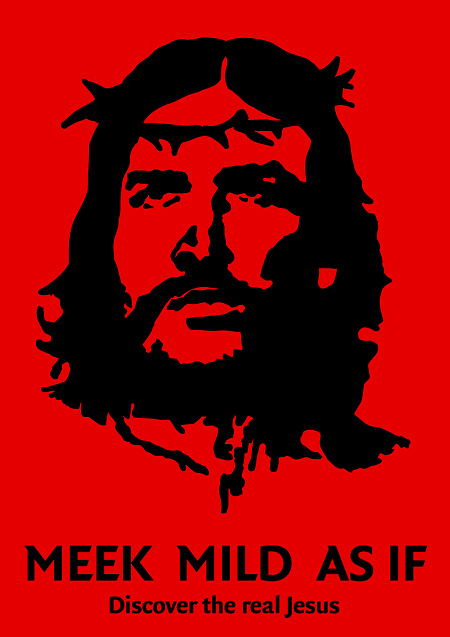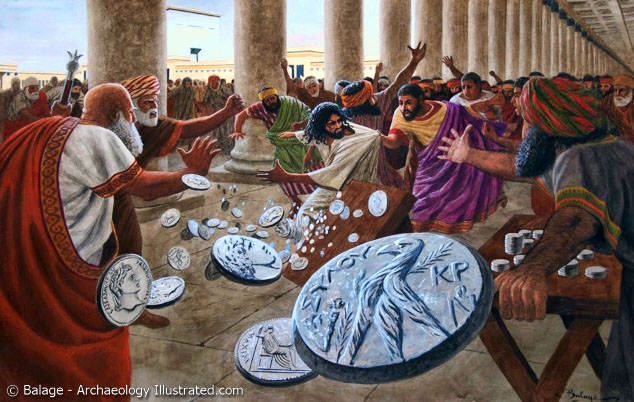Who is this man?
That’s the question asked throughout the texts we listen to this week, and the question we ask ourselves today.
The Mighty Prophet
The Cleansing of the Temple
In response to this question asked by the city of Jerusalem, as they witness the paradoxical grandeur of Jesus. The faceless moving throng in the text asserts that Jesus is the prophet come from Galilee. He comes into the temple – the center of Jewish worship, and thus that center of Jewish identity, social structure, ethical frameworks, political hierarchy – the entire worldview – and he demands justice. He’s not only love. He’s also justice. He overturns the tables in the Temple – the outer courtyard, the courtyard of the Gentiles, to which the most people could penetrate in the edifice and where at that time money changers were installed. One needed money to purchase animals for sacrifice in the inner temple. Yet no foreign money (i.e. Roman) was allowed in the Temple complex, because it contained a graven image, that of the Emperor, who thought of himself as a god. So secular money had to be changed to “sacred” or religiously acceptable money. Jesus rebukes, retorts and casts out what has become a commercialized religion in the place of authentic real spirituality. Matthew inserts several quotes from the great prophets of old into the story to accentuate the prophetic nature of Jesus’ actions and words.
And the foreigners who join themselves to the Lord,
to minister to him, to love the name of the Lord,
and to be his servants,
all who keep the sabbath, and do not profane it,
and hold fast my covenant—
these I will bring to my holy mountain,
and make them joyful in my house of prayer;
their burnt offerings and their sacrifices
will be accepted on my altar;
for my house shall be called a house of prayer
for all peoples.Here you are, trusting in deceptive words to no avail. Will you steal, murder, commit adultery, swear falsely, make offerings to Baal, and go after other gods that you have not known, and then come and stand before me in this house, which is called by my name, and say, “We are safe!”—only to go on doing all these abominations? Has this house, which is called by my name, become a den of robbers in your sight? You know, I too am watching, says the Lord.
Jerusalem quakes at his arrival and his exuberant yet nonviolent stand for justice for all. Verse 10 describes the city as shaken. The Greek word in the text is the one from which we get seismic – as in earthquake. The only times it is used in Matthew are in
Matthew 2:3 at the arrival of the magi
When King Herod heard [the account of the magi], he was frightened, and all Jerusalem with him; 4 and calling together all the chief priests and scribes of the people, he inquired of them where the Messiah was to be born.
Matthew 27:51 at the death of Jesus
Then Jesus cried again with a loud voice and breathed his last. At that moment the curtain of the temple was torn in two, from top to bottom. The earth shook, and the rocks were split.
Matthew 28:1-4 at the resurrection
After the sabbath, as the first day of the week was dawning, Mary Magdalene and the other Mary went to see the tomb. And suddenly there was a great earthquake; for an angel of the Lord, descending from heaven, came and rolled back the stone and sat on it. His appearance was like lightning, and his clothing white as snow. For fear of him the guards shook and became like dead men.
Yet in his righteous indignation and strong stand for justice he is nonviolent, hurting no person, rearranging the furniture, not destroying the livelihood of others. He is truly love and justice. He acts decisively. Powerfully. Authentically. Without hypocrisy. He speaks and stands to change the reputation of God’s house, from one of commercialized for-profit self-centered religion, to one that seeks the well-being of all, the health of all peoples from all nations and ethnicities, the liberation known in the worship of the true God, the Lord of the Exodus.
Question for reflection:
- When do you envision Jesus as a great prophet?
- How does the portrait of Jesus in this textual encounter trouble you?; encourage you?
- How is this Jesus consistent with the other prophets of the First Testament?
- How do you – or we as the church – need to be shaped and transformed by this portrait of Jesus as both love and justice?

